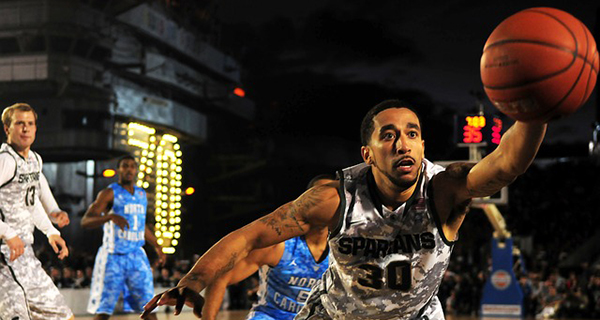 An anonymous National Basketball Association coach, whose team made the playoffs this season, recently said complaints from players about referee calls are “out of control.”
An anonymous National Basketball Association coach, whose team made the playoffs this season, recently said complaints from players about referee calls are “out of control.”
I couldn’t agree more. The incessant crying and moaning by players (and often coaches) over seemingly every whistle by NBA officials takes away from the game and the fan experience. It’s maddening to watch, game after game.
Bottom line: it’s classic poor sportsmanship. It’s egos run amok. It’s “I’m right and you’re wrong.” It’s “You’re being unfair to me.” It’s “You’re out to get me.”
Me, me, me, me. …
Here’s the reality: 99.9 per cent of basketball officials and referees in any sport try to do their best to get calls – and non-calls – right. They don’t care who wins the games. They don’t care if certain players play well. They just want to keep the game fair and safe for competitors on both sides.
That said, the overarching issue here goes beyond complaining about the calls of referees. It’s the trash-talking to an opponent after a score. It’s flexing one’s muscles and posing after a good play. It’s pounding one’s chest. It’s waving to the crowd and asking for more applause.
For who? The team?
No, for me.
Too many players in the NBA isolate themselves on the Island of Me.
What it reveals is not only bad sportsmanship but also a lack of professionalism.
“It’s important to note that professionalism can be completely unrelated to competence,” writes Peter Stark. “You may be the very best at executing on the technical competencies of your job, but totally lack any semblance of professionalism. Professionalism has less to do with what you do in your job (the results you produce) and a lot more to do with how you produce those results.”
Sports have always brought out the best and worst in people. One of the compelling aspects of sports is that character is openly on display. The problem is, the ugly side of sports is getting way too loud. The ego in sports – all sports, not just the NBA – has gotten out of hand. And as the ego takes centre stage, things like sportsmanship take a back seat.
I get it. There’s a lot of money involved in professional sports, especially come playoff time. But that doesn’t mean players have to act like self-absorbed jackasses.
I believe that ultimately, in the big picture, how you play the game is the most important thing in sports – above and beyond all team and individual accomplishments and awards.
I know that sounds like a quaint, idealistic notion. But no matter how long your sports career lasts, whether it ends after Little League or after winning the Super Bowl, what you’ll most be remembered for is what kind of person you were, what kind of competitor you were, what kind of teammate you were, and whether you respected opponents, referees and the game itself. In short, whether you were a good sport or a bad sport.
Consider two baseball Hall of Famers, Ty Cobb and Harmon Killebrew. Both were great players but both were probably better known for how they played the game and carried themselves, on and off the field.
Cobb played with anger on the field, regularly sliding into opponents with his spikes up. Sportsmanship wasn’t important to him, only winning. He was also a well-known racist who was disliked by opponents and teammates alike.
“I think if I had my life to live over again, I’d do things a little different,” said Cobb near the end of his life. “I was aggressive, perhaps too aggressive. Maybe I went too far. I always had to be right in any argument I was in. I always had to be first in everything. I do indeed think I would have done some things different. And if I had, I believe I would have had more friends.”
Killebrew, on the other hand, was respected and liked by virtually everyone who came into contact with him, including opponents.
A fellow Hall of Famer, George Brett, had this to say about Killebrew: “He was just a fierce competitor and a perfect gentleman at the same time. You don’t see that a lot. Sometimes you get fierce competitors who are bad people. You see guys that are not fierce competitors but not nice guys. You don’t see the two of them together very much.”
Sport, at its best, is a co-operative activity in which competitors on both sides play with honour in a mutual quest for excellence. As such, our opponents are also our colleagues. We compete with our opponents, not against them. And the referees are there to make sure everyone is playing by the same rules.
David Light Shields and Brenda Light Bredemeier wrote a thought-provoking book called True Competition: A Guide to Pursuing Excellence in Sport and Society. They make an important distinction between “true competition” and “decompetition.”
True competition is in essence a partnership in which opponents play ethically against each other to optimize performance, develop life skills and have fun. Decompetition is based on a metaphor of war, in which antagonistic conflict reigns and the goal is simply to come out on top – at whatever cost.
The concepts of sportsmanship and true competition remind us that there are things more important than winning and the ‘glory of me.’ Sport, at its best, is about respect, honour and relationships.
Sportsmanship and true competition are soul-based. They’re the spiritual aspect of sports. And they’re the polar opposite of the ego-based win-at-all-costs and it’s-all-about-me mentalities that have become too prevalent in the sports world.
Grantland Rice had it right in his famous poem:
“For when the One Great Scorer comes
To mark against your name,
He writes – not that you won or lost –
But how you played the Game.”
Those four simple – but powerful – lines should be posted at the entrance of every sports venue and on every locker room door across the globe.
And since we have to start somewhere, let’s start with the NBA.
Ken Reed is sports policy director for League of Fans (leagueoffans.org), a sports reform project. He is the author of The Sports Reformers, Ego vs. Soul in Sports, and How We Can Save Sports.
The views, opinions and positions expressed by columnists and contributors are the author’s alone. They do not inherently or expressly reflect the views, opinions and/or positions of our publication.


